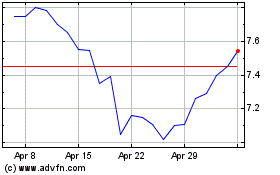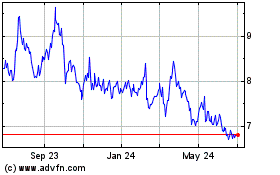By Sean McLain
This article is being republished as part of our daily
reproduction of WSJ.com articles that also appeared in the U.S.
print edition of The Wall Street Journal (December 10, 2018).
TOKYO -- Nissan Motor Co.'s Carlos Ghosn was planning to replace
the company's chief executive before the plan was derailed by Mr.
Ghosn's arrest in Tokyo last month, according to people with
knowledge of the matter.
Word of Mr. Ghosn's plan adds a new twist to the drama inside
Nissan. CEO Hiroto Saikawa has said the company was investigating
possible misuse of corporate assets and other alleged wrongdoing by
Mr. Ghosn for months this year and was supplying information to
Tokyo prosecutors.
While that internal investigation was going on, Mr. Ghosn was
growing increasingly dissatisfied with Mr. Saikawa's handling of
business problems at Nissan including a slowdown in U.S. sales and
repeated quality issues in Japan, say people familiar with the
matter.
Meanwhile, Japanese prosecutors on Monday indicted Mr. Ghosn on
charges of underreporting his compensation on five years of
Nissan's financial reports, Kyodo News reported. The office of his
lawyer, Motonari Otsuru, declined to comment. People familiar with
the matter have said the compensation that prosecutors describe as
unreported was deferred until after Mr. Ghosn's retirement.
In addition, Nissan as a company was indicted over the same
charges, Kyodo said. A Nissan representative declined to
comment.
Also indicted Monday was former Nissan representative director
Greg Kelly, who served as Mr. Ghosn's right-hand man at the
company, Kyodo reported. A lawyer for Mr. Kelly said his client
believed the future payments weren't fixed amounts and so didn't
have to be reported in financial filings. Using company channels,
Mr. Kelly solicited the views of outside experts and was told the
unreported deferred compensation was fine, Mr. Kelly's lawyer,
Yoichi Kitamura, said.
Mr. Ghosn had expressed a desire for months to shake up the
senior-management ranks at Nissan and made known to some executives
his plan to replace Mr. Saikawa, said people familiar with the
plan.
One of the people said Mr. Ghosn told associates he wanted to
put Mr. Saikawa's ouster to a vote at a Nissan board meeting set
for late November.
Instead, the board voted unanimously on Nov. 22 to oust Mr.
Ghosn as chairman after hearing the results of Nissan's
investigation into his alleged financial misdeeds.
Mr. Saikawa couldn't be reached for comment. It isn't known
whether he was aware of Mr. Ghosn's plans for a management shake-up
or whether the internal Nissan drama was connected to the timing of
the arrest.
At the time of his arrest, Mr. Ghosn, as chairman of Nissan, was
considered the ultimate decision maker at the company. Mr. Saikawa
has said that Mr. Ghosn had too much power within Nissan and its
alliance with French car maker Renault SA. Mr. Ghosn is chief
executive and chairman of Renault, which owns a 43% stake in Nissan
and has three board seats at the Japanese car maker.
Frictions between Renault and Nissan have risen in recent years.
Some executives at Nissan, the larger and more profitable of the
two, have expressed concern about Renault's influence on Nissan's
business decisions.
Within Nissan, tensions before Mr. Ghosn's arrest involved not
only the future of the alliance but also Nissan's own business
struggles. Sales in the U.S. have declined year-over-year in six of
the past eight months. Mr. Saikawa said Nissan needed to bolster
U.S. profit margins, but initial efforts to get profits up by
trimming spending on incentives caused sales to crater in
April.
In Japan, the company has recalled more than a million cars
since discovering issues with inspections at Nissan's factories
more than a year ago, and the problems keep coming. On Friday,
Nissan said it found workers in Japan incorrectly tested parking
brakes and steering on some vehicles.
When he stepped down as Nissan's chief executive in 2017, Mr.
Ghosn handpicked Mr. Saikawa as his successor, and he continued to
support the Japanese executive in public. Behind closed doors, the
two clashed over Nissan's problems, people familiar with their
disputes said.
Still, not everyone believed Mr. Saikawa's job was in danger.
One person familiar with the relationship between the men said
their differences hadn't reached a point where Mr. Ghosn would have
contemplated removing Mr. Saikawa.
In Mr. Ghosn's final years as Nissan chief executive, he pushed
to reach an 8% share of global auto sales and an 8% operating
margin. The company missed both those targets.
Mr. Ghosn believed that only the largest car makers would
survive in a future of self-driving and electric cars, and he said
the alliance of Nissan, Renault and Mitsubishi Motors Corp. should
seek to sell 14 million cars by 2022, up from 10.6 million last
year.
"With the explosion of technology that is coming, it is going to
make it very difficult for smaller players to follow," Mr. Ghosn
told The Wall Street Journal in September 2017.
Two months later, Mr. Saikawa offered a different perspective at
a news conference, saying Nissan's efforts to expand volume were
eating into profitability.
"Of course, everyone wants to see how big the company will be
eventually, but the most important thing for a company is cash
flow," Mr. Saikawa said.
Mr. Ghosn was an executive at Renault when the French auto maker
took a big stake in Nissan in 1999. Dispatched to Japan that year
to fix Nissan, Mr. Ghosn executed a rapid turnaround. For years,
Mr. Saikawa worked closely by his side helping Nissan reduce costs
in its supply chain.
When Mr. Saikawa's appointment as chief executive was announced
last year, Mr. Ghosn said Mr. Saikawa was a man he could "totally
trust."
As the relationship soured, some people within Nissan believed
that José Muñoz, the chief performance officer, might be in line
for Mr. Saikawa's job, according to people familiar with internal
discussions at Nissan. Until the end of last year, Mr. Muñoz was
head of Nissan's North American operations and he led the push to
expand the company's U.S. market share. In March, Mr. Muñoz was put
in charge of China operations and remained Nissan's performance
chief.
However, Mr. Saikawa blamed Mr. Muñoz for Nissan's diminished
U.S. profitability as well as the current sales decline, said one
person familiar with their conversations. Mr. Muñoz couldn't be
reached for comment.
Write to Sean McLain at sean.mclain@wsj.com
(END) Dow Jones Newswires
December 10, 2018 02:47 ET (07:47 GMT)
Copyright (c) 2018 Dow Jones & Company, Inc.
Nissan Motor (PK) (USOTC:NSANY)
Historical Stock Chart
From Jun 2024 to Jul 2024

Nissan Motor (PK) (USOTC:NSANY)
Historical Stock Chart
From Jul 2023 to Jul 2024
